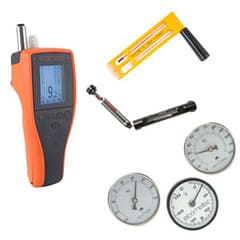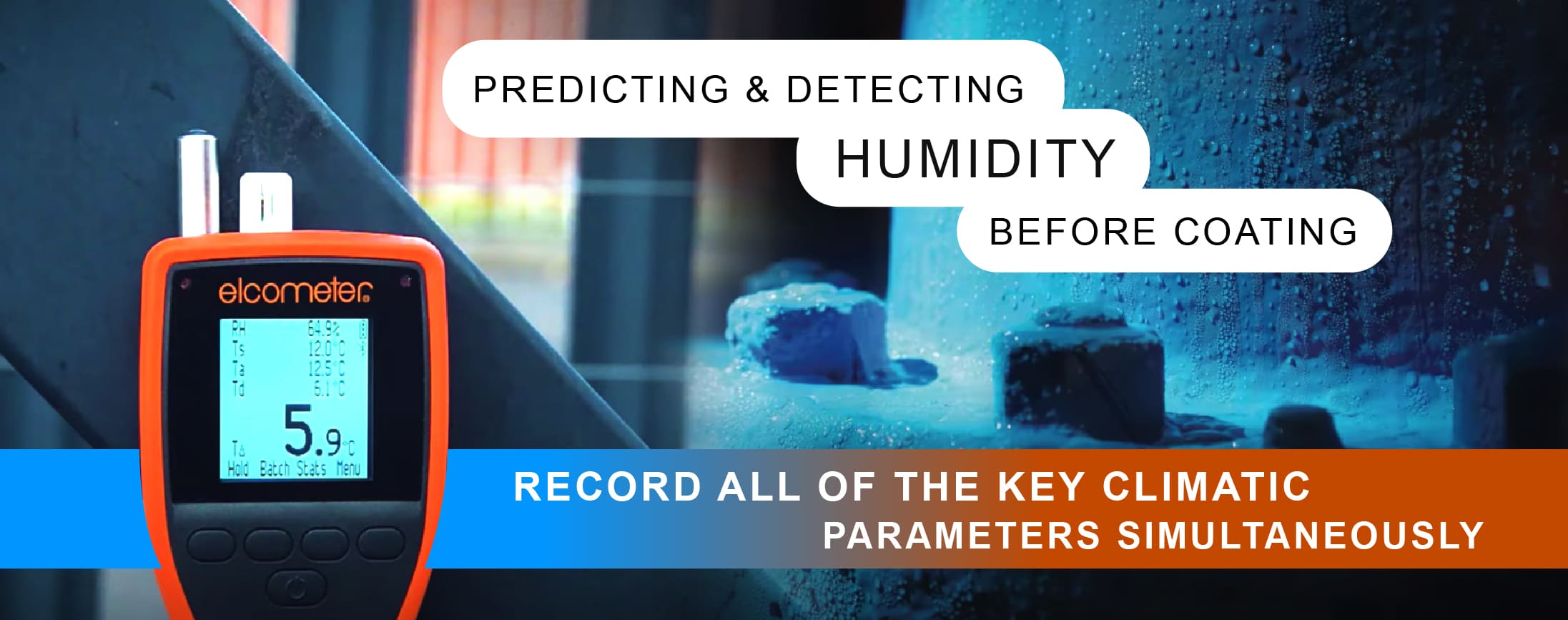1. SURFACE TEMPERATURE (Ts)
the temperature of the surface to be painted
2. AIR TEMPERATURE (Ta)
the temperature of the air surrounding the surface to be painted
3. % RELATIVE HUMIDITY (RH)
the amount of water vapor present in the air compared to the maximum possible expressed as a percentage
4. WET BULB TEMPERATURE (Twb)
the air temperature as read by a thermometer that’s covered in the water-soaked fabric over which air is passed
5. DRY BULB TEMPERATURE (Tdb)
the temperature that is usually thought of as air temperature
6. DEWPOINT (Td)
the temperature at which moisture condenses on a surface, calculated from the air temperature and % Relative Humidity
7. DELTA T (TΔ)
the difference between the surface temperature (Ts) and the dewpoint temperature (Td)
In the case of protective coatings, dampness can appear on the surface when the temperature is sufficiently low and cause condensation. The dewpoint temperature (Td) is the point when this happens.
Why Delta T measurement is so important

By far the most important parameter of all is the Delta T, as it tells you the difference between the surface temperature and the dewpoint temperature. The smaller the difference, the more likely that moisture (or dew) will have condensed on the surface.
It is generally accepted within the industry that the Delta T should be at least 3°C (5°F) or higher for the coating to be applied.
How do you actually measure and calculate the key climatic parameters? There are two main methods you can follow.
The traditional method requires multiple pieces of equipment to complete.
The first piece required is the whirling hygrometer, also known as a sling psychrometer, and it is used to measure the wet bulb and dry bulb temperatures. These temperatures are then used to work out the dewpoint and relative humidity. Elcometer provides two types of hygrometers, but they work in pretty much the same way.
How does a hygrometer work?
Hygrometers consist of two liquid-filled thermometers positioned side-by-side in a rotating body. One thermometer is covered with a fabric “sock” or “wick” connected to a reservoir (this measures your wet bulb temperature), while the other is uncovered (this measures your dry bulb temperature).
Once you have your results, typically conversion tables are then used to determine the relative humidity and dewpoint temperature, like the ones supplied with the Elcometer 116 Hygrometers. Alternatively, the Elcometer 114 Dewpoint Calculator provides a quick and easy way to determine these values, and we show you how it works in our Elcometer 114 video: https://youtu.be/HLbuapAnoqA
Calculation Delta T
However manual Hygrometers are still missing the all-important Delta T measurement, and to calculate this, you still need a surface temperature measurement – something a hygrometer can’t provide, meaning you’ll need a separate surface thermometer. Once you have your surface temperature, subtract your dewpoint temperature from it, and you have the Delta T.
A digital gauge makes this process very easy. It also continuously monitor and log the conditions as you paint, and instantly alarm if one of the parameters falls outside of the specified range.
it can continuously monitor and log the conditions as you paint, and instantly alarm if one of the parameters falls outside of the specified range.
Elcometer gauges for dewpoint temperature
Dewpoint Temperature is calculated by recording the surface temp (Ts) vs air temp (Ta) and its relative humidity (%RH). This difference (TΔ) is the determining factor in surface preparation for painting. The Elcometer 319 dew point meter can be used as a hand-held gauge or a stand-alone data logger – ideal for monitoring climatic conditions over a period of time. The Elcometer 114 Dew Point Calculator provides accurate values of Dewpoint and Relative Humidity (RH) from the wet and dry bulb temperatures measured by Whirling or Sling Hygrometers / relative humidity meters.
The Elcometer 308 digital hygrometer has been specifically designed for use in very hot climates where the surface temperature of the substrate can exceed the paint manufacturer’s recommended limits for successful painting Surface Temperature (Ts).
Observing climatic conditions like temperature, relative stickiness, dew point, and dampness is imperative for the successful adhesion of a coating.
![]() Elcometer 308_instruction_manual.pdf
Elcometer 308_instruction_manual.pdf

 0 items
0 items

